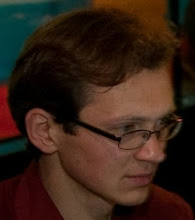Word and Image II
Yves Klein famously made his first artwork when he "signed the sky", after dividing up the artistic universe between him and Arman (who chose the earth) and Claude Pascal (who chose words). Drawing a dividing line in the sky seemed to me the perfect tribute.
dinsdag 30 augustus 2011
zondag 28 augustus 2011
Word and Image

I'm still looking for a proper name for this project - "Word and Image" is rather lame but The textual image or something along that line sounds like art school Derridean.
Anyway, it is another extension of my postcard project (along with Fading in and out of meaning and Voices from afar) that exploits the visual impact of words and the tension between image and meaning. Like voices from afar, it invites participation:
send me your image and I'll give it some text, or get some text and find an image to it.
Or any other way round (though I prefer to do the text).
[click to enlarge images]
woensdag 17 augustus 2011
Jeder Mensch ein Künstler?
The role of ideals in reasoning (3)
Jeder Mensch ein Künstler. The maxim sums up neatly our modern condition: we have to be original. It is no longer morally sufficient, no, it is even morally reproachable, just to be a good citizen or a good Christian or a good ---. For to follow such a readymade moral identity and the guidelines, restrictions and aims that come with it reduces you to someone acting out moral rules. In the kingdom come, we shall all have fifteen minutes of fame.
This predicament, paradoxically, is both democratic and elitist. It is democratic because self-realization is – or at least should be – open to anyone. It is elitist because it requires one to rise above moral restrictions: each man an Übermensch. The compromise is to give each his little space for self-realization and respect that of the other. But this is not a sufficient conception of self-realization: it brackets the motivation for what we are doing and trying to be, and puts our motives and ideals beyond scrutiny. Without a substantial way of reasoning about ends, it reduces us to Nelsons in our own bathtubs.
Jeder Mensch ein Künstler. The maxim sums up neatly our modern condition: we have to be original. It is no longer morally sufficient, no, it is even morally reproachable, just to be a good citizen or a good Christian or a good ---. For to follow such a readymade moral identity and the guidelines, restrictions and aims that come with it reduces you to someone acting out moral rules. In the kingdom come, we shall all have fifteen minutes of fame.
This predicament, paradoxically, is both democratic and elitist. It is democratic because self-realization is – or at least should be – open to anyone. It is elitist because it requires one to rise above moral restrictions: each man an Übermensch. The compromise is to give each his little space for self-realization and respect that of the other. But this is not a sufficient conception of self-realization: it brackets the motivation for what we are doing and trying to be, and puts our motives and ideals beyond scrutiny. Without a substantial way of reasoning about ends, it reduces us to Nelsons in our own bathtubs.
dinsdag 2 augustus 2011
Impressions of Romania
1. Bucharest is unlike any place I’ve seen before. It has a somewhat Parisian allure with art nouveau doorways, large art deco concrete apartment blocks reminiscent of Italian fascist architecture, and trams and trolleys that are distinctly Mitteleuropa. On top of that, of course, there is chaos, ugliness, old facades that suddenly end in communist monsters, new buildings springing out of old buildings, Ceauscescean megalomania, and the sense that something is gone.
2. Gibbon, visiting the principal palace in Turin, saw in every gilt ornament a Savoyard village dying of hunger. He had not seen yet the Palace of the People in Bucharest.
3. An old woman was cleaning the streets in the early morning. She was probably in her seventies. I would have given her some money if that had not been a colonial thing to do.
4. The Italians call plums “aiutano” [little helper] because of their laxative effect.
5. Romanian has two accents to put on the “a”, which transform it into a short úh and a long úhhh respectively – a distinction that most foreign language speakers, including me, can’t hear, like they can’t hear the difference between Dutch a and aa.
6. Although it is bottled in plastic water bottles, it is not as if every village distills its own palinka. Actually it is quite difficult to do it well.
7. I first was worried why they didn’t serve fruits in Olteanca. The reason for that is that you can pluck them off the trees.
8. There were less Gypsies on the streets then you’d expect in Bucharest. I’ve been told, however, that they squat the vacant apartments above the shops in Bulevardul I.C. Bratianu.
9. You can ride all the way from Olteanca to Bucharest without encountering one traffic sign. There is, incidentally, also no such thing as a highway to the southwest.
10. The violin with a thread attached to the highest string is among the cooler ‘prepared instrument’ tricks I’ve seen so far. And this was Olteanca, not STEIM or Muziekgebouw aan ‘t IJ or something.
11. Back home in Amsterdam, Romanian street musicians are playing melancholy tunes by my window.
Abonneren op:
Posts (Atom)





